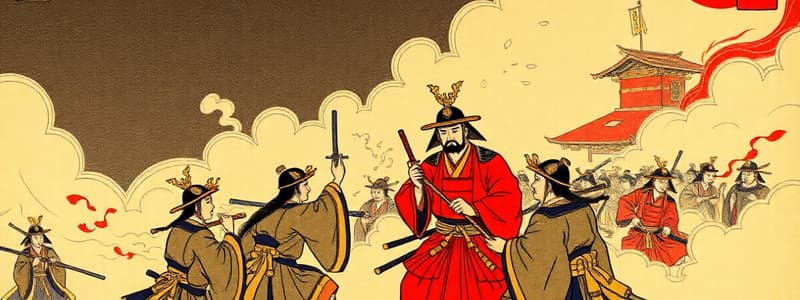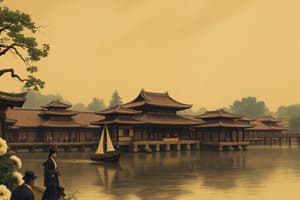Podcast
Questions and Answers
What was the primary role of the Shogun during the Tokugawa Shogunate?
What was the primary role of the Shogun during the Tokugawa Shogunate?
- To act as the figurehead emperor
- To engage in trade with foreign nations
- To govern the country as the sole ruler (correct)
- To represent the samurai in battle
Which of the following best describes the social hierarchy during the Tokugawa Shogunate?
Which of the following best describes the social hierarchy during the Tokugawa Shogunate?
- Emperor, Samurai, Merchants, Peasants
- Shogun, Daimyos, Peasants, Artisans
- Merchants, Samurai, Nobility, Commoners
- Emperor, Shogun, Daimyos, Samurai (correct)
What was the significance of Bushido in the context of the Tokugawa period?
What was the significance of Bushido in the context of the Tokugawa period?
- It served as the moral code for samurai behavior. (correct)
- It was a government policy regulating trade practices.
- It was a type of martial arts practiced by peasants.
- It dictated the lifestyle of merchants in urban areas.
What was one of the economic conditions of Japan during the Tokugawa Shogunate?
What was one of the economic conditions of Japan during the Tokugawa Shogunate?
Which of the following statements is true regarding Japan's interaction with outside influences during the Tokugawa period?
Which of the following statements is true regarding Japan's interaction with outside influences during the Tokugawa period?
What cultural development arose as a result of peasants fleeing to Old Edo?
What cultural development arose as a result of peasants fleeing to Old Edo?
Who was Tokugawa Ieyasu and what was his notable contribution?
Who was Tokugawa Ieyasu and what was his notable contribution?
What impact did the introduction of gunpowder technology have during the Tokugawa period?
What impact did the introduction of gunpowder technology have during the Tokugawa period?
What was a major religious belief during the Tokugawa Shogunate?
What was a major religious belief during the Tokugawa Shogunate?
Which event marked the beginning of Japan's transition to modernization in the late 19th century?
Which event marked the beginning of Japan's transition to modernization in the late 19th century?
Flashcards
Tokugawa Shogunate years
Tokugawa Shogunate years
The period in Japanese history from 1467 to 1658, characterized by conflict among powerful landowners and warring states.
Tokugawa Ieyasu
Tokugawa Ieyasu
The person who established himself as the sole ruler of Japan (shogun).
Shogun
Shogun
The military leader of Japan, holding real power, while the Emperor remained a figurehead.
Daimyo
Daimyo
Signup and view all the flashcards
Bushido
Bushido
Signup and view all the flashcards
Social Hierarchy (Japan)
Social Hierarchy (Japan)
Signup and view all the flashcards
Kabuki Theater
Kabuki Theater
Signup and view all the flashcards
Zen Buddhism
Zen Buddhism
Signup and view all the flashcards
Meiji Restoration
Meiji Restoration
Signup and view all the flashcards
Edo (Tokyo)
Edo (Tokyo)
Signup and view all the flashcards
Study Notes
The Tokugawa Shogunate
- Marked by a period of internal conflict (1467-1658) between powerful landowning lords and warring states.
- Shared historical parallels with Western European development, including ancient empires and medieval periods.
- Similar to European feudal systems, including a rigid social hierarchy.
- Characterized by significant wealth inequality.
- Peasants were considered a lower class and were largely bound to the land.
- A feudal system existed, with a hierarchy of power.
- The Emperor was a figurehead, while Daimyos (feudal lords) held significant power and authority (vassals to the King).
- Samurai, warriors (often land-owning), served the Daimyos.
- Japan, unlike some societies, wasn't a hydraulic society, requiring strong central governance.
Tokugawa Ieyasu and Shogunate Consolidation
- Tokugawa Ieyasu emerged as the sole ruler, defeating rival Daimyos at the Battle of Seki.
- He became Shogun, maintaining the Emperor as a symbolic figure.
- Established Edo (modern Tokyo) as the capital.
- Economy remained stable, yet peasants were significantly taxed.
Social Hierarchy
- Rigid social hierarchy, with the Emperor at the top, followed by the Shogun, then the Daimyos, Samurai, Peasants, Artisans and Merchants.
- Peasants' heavy taxation contributed to population shifts to urban areas, particularly around Edo (Tokyo).
- This migration supported the growth of urban cultures.
Cultural Developments
- Kabuki theatre, a highly decorative form of theatre, emerged.
- It was predominantly performed by men.
- Zen Buddhism was the dominant religion, emphasizing mental and physical discipline, to achieve enlightenment (Nirvana).
Isolationism and Stagnation
- Japan limited outside influence by suppressing Christianity and controlling trade.
- This isolation prevented significant development until Commodore Perry's arrival in the 1850s.
The Meiji Restoration
- Following Commodore Perry's arrival, Japan underwent rapid modernization (within a decade).
- This resulted in the emergence of modern urban centers.
- The Meiji Restoration period is recognized for modernization efforts.
- Modernization led to the rise of an authoritarian political system similar to fascism.
Studying That Suits You
Use AI to generate personalized quizzes and flashcards to suit your learning preferences.




